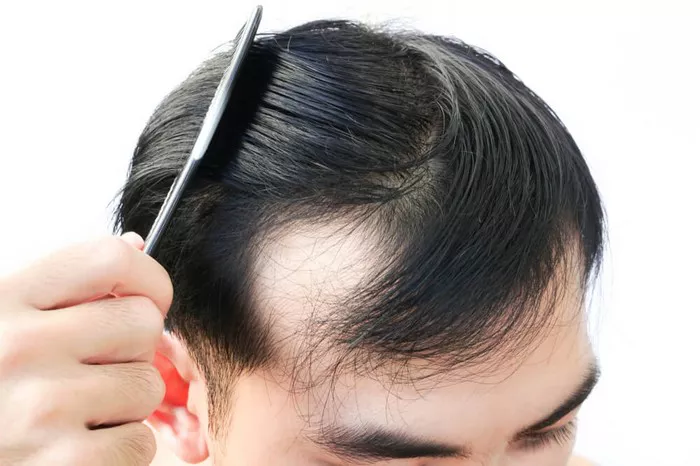Hair loss can be a distressing experience, especially for teenage guys who are often at a sensitive and self-conscious stage of their lives. Understanding the causes, identifying effective treatments, and implementing preventive measures can significantly help in managing and stopping hair loss. This guide delves deep into these aspects to provide a holistic approach to tackling hair loss in teenage boys.
Understanding Hair Loss in Teenage Boys
Hair loss, medically known as alopecia, can manifest in various forms and is influenced by a multitude of factors. While it’s more common in adults, teenagers are not immune. The emotional and psychological impact can be profound, affecting self-esteem and social interactions.
Types of Hair Loss
1. Androgenetic Alopecia (Male Pattern Baldness): This is the most common type, often hereditary, and characterized by a receding hairline and thinning at the crown.
2. Alopecia Areata: An autoimmune condition causing round patches of hair loss on the scalp and other areas of the body.
3. Telogen Effluvium: A temporary form of hair loss often triggered by stress, illness, or nutritional deficiencies, leading to diffuse thinning.
4. Traction Alopecia: Resulting from hairstyles that pull on the hair follicles, such as tight braids or ponytails.
Identifying the Causes of Hair Loss in Teenage Boys
Pinpointing the exact cause of hair loss is crucial for effective treatment. Common causes include:
1. Genetics: A family history of hair loss can increase the likelihood.
2. Hormonal Changes: Puberty brings hormonal fluctuations that can affect hair growth.
3. Nutritional Deficiencies: Lack of essential nutrients like iron, zinc, and vitamins can lead to hair thinning.
4. Stress: Emotional and physical stress can push hair follicles into a resting phase, resulting in shedding.
5. Medical Conditions: Conditions like thyroid disorders, diabetes, and lupus can contribute to hair loss.
6. Medications: Certain drugs, including acne treatments and chemotherapy, can cause hair loss as a side effect.
7. Hair Care Practices: Excessive use of heat styling tools, chemical treatments, and improper grooming can damage hair and lead to loss.
Effective Treatments for Hair Loss in Teenage Boys
Medical Treatments
1. Topical Treatments
Minoxidil: Over-the-counter topical treatment that can stimulate hair growth and slow hair loss. It’s FDA-approved and widely used.
2. Oral Medications
Finasteride: A prescription medication that inhibits the hormone responsible for hair loss. Not typically recommended for teenagers due to potential side effects and the need for medical supervision.
See Also: How to Stop Hair Fall for Oily Scalp: Things You Need To Know
3. Steroid Injections
For alopecia areata, corticosteroid injections can reduce inflammation and promote hair regrowth in affected areas.
Nutritional Interventions
1. Balanced Diet: Ensuring a diet rich in essential nutrients can significantly impact hair health.
- Protein: Found in meat, dairy, beans, and nuts, protein is vital for hair growth.
- Iron: Red meat, leafy greens, and legumes are excellent sources.
- Zinc and Biotin: Eggs, nuts, and whole grains can help support hair strength and growth.
- Omega-3 Fatty Acids: Found in fish, flaxseeds, and walnuts, these promote scalp health.
2. Supplements: If dietary intake is insufficient, supplements can help. Consulting a healthcare provider is crucial before starting any supplement regimen.
Lifestyle Changes
1. Stress Management: Techniques such as mindfulness, meditation, and physical exercise can reduce stress levels and improve overall well-being.
2. Proper Hair Care: Gentle handling of hair, avoiding excessive heat and chemical treatments, and using mild shampoos can prevent damage.
3. Adequate Sleep: Quality sleep is essential for overall health, including hair health. Aim for 7-9 hours of sleep per night.
Preventive Measures for Hair Loss in Teenage Boys
1. Regular Scalp Care: Keeping the scalp clean and free of dandruff can prevent hair loss. Regular washing with a mild shampoo is recommended.
2. Avoiding Tight Hairstyles: Opt for looser hairstyles to prevent traction alopecia.
3. Reducing Chemical Exposure: Limiting the use of hair dyes, relaxers, and other chemical treatments can prevent follicle damage.
4. Protecting Hair from Environmental Damage: Wearing hats or using protective products can shield hair from sun damage and pollution.
Psychological Support for Hair Loss in Teenage Boys
Hair loss can take a toll on a teenager’s mental health. Support from family, friends, and professionals can make a significant difference.
1. Counseling: Therapy can help manage the emotional impact of hair loss.
2. Support Groups: Connecting with others experiencing similar issues can provide comfort and practical advice.
3. Education and Awareness: Understanding that hair loss is a common issue and exploring ways to manage it can empower teenagers to handle the situation more confidently.
When to See a Doctor
Consulting a healthcare provider is crucial if hair loss is sudden, severe, or accompanied by other symptoms such as pain or scalp inflammation. A doctor can conduct a thorough examination, possibly including blood tests or a scalp biopsy, to diagnose the underlying cause and recommend appropriate treatment.
Conclusion
Hair loss in teenage boys can be challenging, but with the right approach, it can be managed effectively. Understanding the types and causes of hair loss, implementing medical and nutritional treatments, adopting preventive measures, and seeking psychological support can all contribute to stopping and reversing hair loss. Early intervention and a proactive attitude are key to maintaining healthy hair and self-confidence during these formative years.


